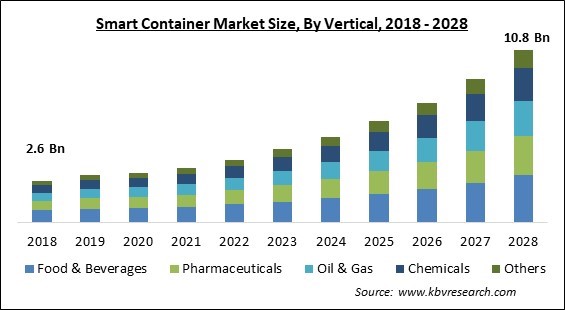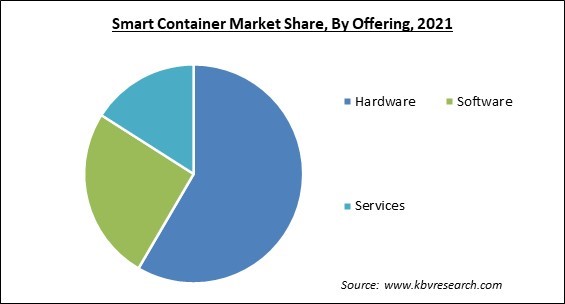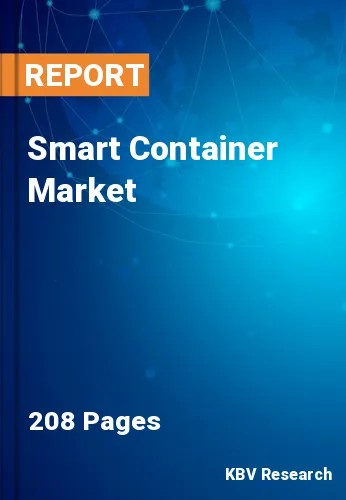The Global Smart Container Market size is expected to reach $10.8 billion by 2028, rising at a market growth of 18.2% CAGR during the forecast period.
Smart containers refer to shipping containers equipped with IoT (Internet of Things), GPS tracking, and sensors that are used for logistics & freight. These containers are developed to regulate internal temperature, enhance the security of goods stored in containers, and keep a track of real-time location via GPS. The main aim of smart containers is to alter the risk of potential issues with cargo.

Smart containers are considered crucial in making the supply chain more efficient, sustainable, and safer. These are similar to regular containers with additional sensors connected to them for keeping regular track of real time information. The data collected through these sensors may result in optimizing the supply chain.
Sensor data help in getting hyper-accurate information regarding the inside temperature, container’s location, and other conditions, which helps businesses in the efficient management of goods within spending fewer resources. Furthermore, data provided by these sensors help in avoiding possible hazards that may occur due to the climatic and changes in conditions. Another benefit of these sensors is that the stakeholder would be able know the progress of containers with shipping.
This further enables customers as well as operators to predict the estimated time at which goods may reach the destination, thereby preventing disruptions in the supply chain. Smart containers serve certain benefits to logistic companies. In the past, the required data to ensure the safety of goods was collected manually. Still, smart technologies used in these containers could efficiently substitute this, which would result in reducing the expenditure along with saving time.
The widespread of novel coronavirus has severely affected the world’s economy and almost all industries. The pandemic resulted in the implementation of lockdown and travel restrictions by governments of various affected nations, leading to disruption in the working of multiple sectors. The supply chains were severely disrupted due to the trade restrictions imposed with the aim of curbing the spread of the virus. Furthermore, the production of smart containers also decreased, which resulted in raising the overall prices of containers. These increased prices further resulted in lowering the adoption of smart containers, thereby declining sales.
Maritime transportation is the most used mode of shipping. With the rising adoption of technologies in the logistics industry due to the arrival of smart logistics facilities, most logistics shipping businesses are implementing IoT devices. The trucking & logistics businesses are integrating data analytics, self-driving technologies, and robotics with the aim of increasing the effectiveness of operations and addressing other issues in the industry.
The emergence of logistics 4.0 in the shipping and freight sector brings an essential upgrade to the supply chain, which has been operated conventionally since the past. Furthermore, growing penetration of the internet, increasing demand for automation, rising integration of smart technologies, and adoption of advanced logistic solutions across the globe with the aim to enhance efficiency are resulting in the growing adoption of logistic 4.0 trends.
One of the major risks for the shipping industry in the integration of smart technologies is cyberattacks. This is mainly because of the less awareness and inefficient tools implemented within the industry. The shipping industry is a major target for cyber attackers, as the industry is flourishing continuously. Furthermore, it is observed by a number of researchers that the industry is not capable enough to efficiently work with the technologies by dealing with these cyber threats.
By vertical, the smart container market is divided into food & beverages, pharmaceuticals, oil & gas, chemicals and others. In 2021, the food & beverages segment witnessed the highest revenue share in the smart container market. Traditionally, the food & beverage sector suffered a lot due to logistical challenges such as change in climatic conditions of different regions where cargo is being exported. Due to this, large quantity of food & beverages used to get rotten resulting in heavy revenue losses to the industry. The use of smart containers enables the food & beverages to reduce the risk by allowing them to manage container temperature accordingly.

Based on offering, the smart container market is segmented into hardware, software and services. The software segment acquired a significant revenue share in the smart container market in 2021. The smart container software is also called middleware or an interface between the location-based data, which helps in the analysis of data to gather the required information. The market is being driven in this segment due to the rising demand for software-based smart solutions to enhance analytic support and thereby providing actionable insight for transporters regarding delays and other concerns.
On the basis of technology, the smart container market is fragmented into Global Positioning Systems (GPS), cellular, LoRa Wan (Long Range Wide Area Network), and Bluetooth low energy (BLE). The Bluetooth low energy segment covered a substantial revenue share in the smart container market in 2021. The rapid adoption of BLE technology is the result of the explosion of IoT devices which require efficient means of communication. Furthermore, as most of the smart containers are equipped with IoT, the integration of BLE technology becomes necessary for connectivity and communication. Thus, the demand for BLE would rise during the projection period.
| Report Attribute | Details |
|---|---|
| Market size value in 2021 | USD 3.4 Billion |
| Market size forecast in 2028 | USD 10.8 Billion |
| Base Year | 2021 |
| Historical Period | 2018 to 2020 |
| Forecast Period | 2022 to 2028 |
| Revenue Growth Rate | CAGR of 18.2% from 2022 to 2028 |
| Number of Pages | 208 |
| Number of Tables | 380 |
| Report coverage | Market Trends, Revenue Estimation and Forecast, Segmentation Analysis, Regional and Country Breakdown, Companies Strategic Developments, Company Profiling |
| Segments covered | Offering, Technology, Vertical, Region |
| Country scope | US, Canada, Mexico, Germany, UK, France, Russia, Spain, Italy, China, Japan, India, South Korea, Singapore, Malaysia, Brazil, Argentina, UAE, Saudi Arabia, South Africa, Nigeria |
| Growth Drivers |
|
| Restraints |
|
Region wise, the smart container market is analyzed across North America, Europe, Asia Pacific and LAMEA. The Europe region led the smart container market by generating highest revenue share in 2021. This is due to presence of major market players in the region. The market players in the region are offering hardware solution along with IoT software platforms for efficient data analytics. Furthermore, the wide acceptance of advanced technologies such as ML, AI and IoT in Europe region may result in high demand for smart containers in the upcoming years.
Free Valuable Insights: Global Smart Container Market size to reach USD 10.8 Billion by 2028
The market research report covers the analysis of key stake holders of the market. Key companies profiled in the report include A.P. Moller - Maersk A/S, Orbcomm, Inc. (GI Partners L.P.), SkyCell AG, TRAXENS, AirDAO, ZillionSource Technologies, Berlinger & Co. AG, Globe Tracker, ApS., Nexxiot AG and Phillips Connect (Phillips Industries, Inc.).
By Vertical
By Offering
By Technology
By Geography
The global Smart Container Market size is expected to reach $10.8 billion by 2028.
Rising acceptance of IoT devices by companies in shipping industry are driving the market in coming years, however, Shipping industry is not capable enough to deal with cyber threats restraints the growth of the market.
A.P. Moller - Maersk A/S, Orbcomm, Inc. (GI Partners L.P.), SkyCell AG, TRAXENS, AirDAO, ZillionSource Technologies, Berlinger & Co. AG, Globe Tracker, ApS., Nexxiot AG and Phillips Connect (Phillips Industries, Inc.).
The expected CAGR of the Smart Container Market is 18.2% from 2022 to 2028.
The Hardware market is leading the Global Smart Container Market by Offering in 2021; thereby, achieving a market value of $6.2 Billion by 2028.
The Europe market dominated the Global Smart Container Market by Region in 2021; thereby, achieving a market value of $3.6 Billion by 2028.
Our team of dedicated experts can provide you with attractive expansion opportunities for your business.

